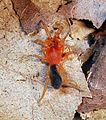Nops (spider)
| Nops Temporal range:
| |
|---|---|

| |
| Nops guanabacoae male, Cuba | |
| Scientific classification | |
| Domain: | Eukaryota |
| Kingdom: | Animalia |
| Phylum: | Arthropoda |
| Subphylum: | Chelicerata |
| Class: | Arachnida |
| Order: | Araneae |
| Infraorder: | Araneomorphae |
| Family: | Caponiidae |
| Genus: | Nops authority = MacLeay, 1839[1] |
| Type species | |
| N. guanabacoae MacLeay, 1839
| |
| Species | |
|
38, see text | |
Nops is a genus of medium-sized South American, Central American, and Caribbean spiders in the family Caponiidae, first described by Alexander Macleay in 1839.[2] It has a great richness on the Caribbean islands, and most mainland species are located in high proportion toward the Caribbean coast. It likely has a neotropical distribution, though most species of South America are known only from the coast of Colombia and Venezuela, including the islands of Aruba, Curaçao, Bonaire and Trinidad.[1]
Monophyly
Nops have subsegmeted tarsi, as well as two other leg characters often found in nopine genera: a ventral translucent keel on the anterior metatarsi and a translucent membrane between the anterior metatarsi and tarsi. These spiders can be distinguished from similar genera with these modifications by their elongated unpaired claw on the anterior legs, extending dorsally between the paired claws.[3][4][5][6]
Species
As of April 2019[update] it contains thirty-eight species plus one fossil in Dominican amber:[7][1]
- Nops agnarssoni Sánchez-Ruiz, Brescovit & Alayón, 2015 – Puerto Rico
- Nops alexenriquei Sánchez-Ruiz & Brescovit, 2018 – Brazil
- Nops amazonas Sánchez-Ruiz & Brescovit, 2018 – Brazil
- Nops anisitsi Strand, 1909 – Paraguay
- Nops bahia Sánchez-Ruiz & Brescovit, 2018 – Brazil
- Nops bellulus Chamberlin, 1916 – Peru
- Nops blandus (Bryant, 1942) – Virgin Is. (US and UK)
- Nops branicki (Taczanowski, 1874) – French Guiana
- Nops campeche Sánchez-Ruiz & Brescovit, 2018 – Mexico, Belize, Costa Rica
- Nops coccineus Simon, 1892 – Saint Vincent and the Grenadines (St. Vincent)
- Nops enae Sánchez-Ruiz, 2004 – Cuba
- Nops ernestoi Sánchez-Ruiz, 2005 – Hispaniola (Dominican Rep.)
- Nops farhati Prosen, 1949 – Argentina
- Nops finisfurvus Sánchez-Ruiz, Brescovit & Alayón, 2015 – Virgin Is. (UK), Puerto Rico (Culebra Is.)
- Nops flutillus Chickering, 1967 – Curaçao
- Nops gertschi Chickering, 1967 – Hispaniola (Dominican Rep.)
- Nops glaucus Hasselt, 1887 – Netherlands Antilles (Bonaire)
- Nops guanabacoae MacLeay, 1839 (type) – Cuba, Bahamas
- Nops hispaniola Sánchez-Ruiz, Brescovit & Alayón, 2015 – Hispaniola (Haiti, Dominican Rep.)
- Nops ipojuca Sánchez-Ruiz & Brescovit, 2018 – Brazil
- Nops itapetinga Sánchez-Ruiz & Brescovit, 2018 – Brazil
- Nops jaragua Sánchez-Ruiz & Brescovit, 2018 – Dominican Rep.
- Nops largus Chickering, 1967 – Panama
- Nops maculatus Simon, 1893 – Venezuela, Trinidad, Guyana
- Nops mathani Simon, 1893 – Brazil
- Nops meridionalis Keyserling, 1891 – Brazil
- Nops minas Sánchez-Ruiz & Brescovit, 2018 – Brazil
- Nops navassa Sánchez-Ruiz & Brescovit, 2018 – Navassa Is. (Haiti or USA)
- Nops nitidus Simon, 1907 – Brazil
- Nops pallidus Sánchez-Ruiz & Brescovit, 2018 – Cuba
- Nops pocone Sánchez-Ruiz & Brescovit, 2018 – Brazil
- Nops quito Dupérré, 2014 – Ecuador
- Nops siboney Sánchez-Ruiz, 2004 – Cuba
- Nops sublaevis Simon, 1893 – Venezuela
- Nops tico Sánchez-Ruiz & Brescovit, 2018 – Costa Rica, Panama
- Nops toballus Chickering, 1967 – Jamaica
- Nops ursumus Chickering, 1967 – Panama
- Nops variabilis Keyserling, 1877 – Colombia, Venezuela
Image gallery
-
Nops craneae Chickering, carapace
-
Nops enae Sánchez-Ruiz
-
Nops guanabacoae MacLeay, female with egg sac
-
Nops guanabacoae MacLeay, male
-
Nops guanabacoae MacLeay, claws on leg I
-
Nops guanabacoae MacLeay, tarso of leg I
-
Nops siboney Sánchez-Ruiz, ventral view
References
- ^ a b c Gloor, Daniel; Nentwig, Wolfgang; Blick, Theo; Kropf, Christian (2019). "Gen. Nops MacLeay, 1839". World Spider Catalog Version 20.0. Natural History Museum Bern. doi:10.24436/2. Retrieved 2019-05-17.
- ^ MacLeay, W. S. (1839). "On some new forms of Arachnida". Annals of Natural History. 2 (7): 1–2.
- ^ Sánchez-Ruiz, A. (2004). "Current taxonomic status of the family Caponiidae (Arachnida, Araneae) in Cuba with the description of two new species" (PDF). Revista Ibérica de Aracnología. 9: 95–102.
- ^ Jiménez, M. L.; Platnick, N. I.; Dupérré, N. (2011). "The haplogyne spider genus Nopsides (Araneae, Caponiidae), with notes on Amrishoonops" (PDF). American Museum Novitates. 3708 (3708): 1–18. doi:10.1206/3708.2. S2CID 84120801.
- ^ Sánchez-Ruiz, A. (2010). "Una nueva especie del género Nops Macleay, 1839 (Araneae, Caponiidae) procedente de Islas Vírgenes de Estados Unidos de América, Antillas Menores". Novitates Caribaea. 3 (3): 22–31. doi:10.33800/nc.v0i3.161.
- ^ Sánchez-Ruiz, A.; Platnick, N.I.; Dupérré, N. (2010). "A new genus of the spider family Caponiidae (Araneae, Haplogynae) from the West Indies" (PDF). American Museum Novitates. 3705: 1–44. doi:10.1206/3705.2. S2CID 81594595.
- ^ Sánchez-Ruiz, A. (2004). "Current taxonomic status of the family Caponiidae (Arachnida, Araneae) in Cuba with the description of two new species" (PDF). Revista Ibérica de Aracnología. 9: 95–102.







